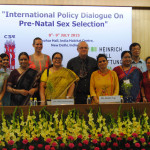On July 11th 1989, the Governing Council of the United Nations Development Programme established World Population Day, to raise awareness on global population issues. Envisaged as an annual event, it was inspired by the public interest in Five Billion Day on July 11, 1987-approximately the date on which the world’s population reached five billion people.


Population control is a serious concern world across, more so in India. According to a newspaper report published in The Guardian, no government in India has successfully formulated policies to manage the country’s human population growth, which stands at 1.6% a year, down from a high of about 2.3% in the 1970s. In the 70s, there were aggressive sterilisation campaigns, mainly targeting men, and various controversies associated with them have hampered the cause of family planning ever since. As per various researches, India is forecast to become the world’s most populous country in 2030, up from 1.25 billion today to nearly 1.5 billion.
Family planning and population control in India is rooted in cultural systems and various false notions. It is considered culturally unacceptable for males to undergo vasectomies, and use of precautions such as condoms or contraceptive pills tends to be a challenge, due to the lack of proper knowledge about them. It is also considered to be expensive to teach illiterate women about the use of these methods, thus many times, the government resorts to mass sterilization of women.
In 2012, A.R Nanda, former secretary, department of family welfare, stated that women need to be at the center of the population control process. He is quoted as saying “If the government thinks it can curb population growth by giving a target to states, then it is only going to increase the vulnerability of women in this process. Women have to be at the centre of benefiting from policies.”
We at CSR, agree with Mr. Nanda’s views and feel that discrimination against women, is hampering the cause of population control. It is necessary for the government to understand that unless men and women are made equal partners in the various schemes related to population control, no good will be achieved. Both genders need to be educated about the perils of overpopulation, and how it has negative repercussions for males and females. Additionally, both need to be educated about the various (safe) methods of population control, as opposed to just creating mass sterilization drives. Population control is not the sole domain of the male or the female- it is a universal concern, and it is high time the government, and civil society realized this.
Looking forward to reading your blogs, you can mail us your entries at WriteWithUs@csrindia.org, or upload them at Write With Us.
Donation for Centre for Social Research to Join our effort in rehabilitating Domestic Violence
Discuss this article on Facebook




